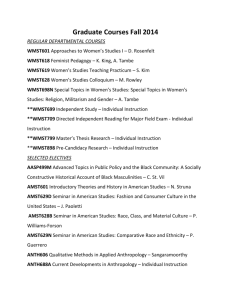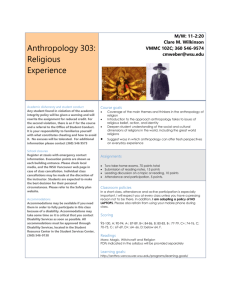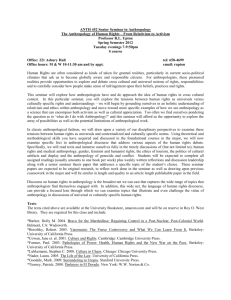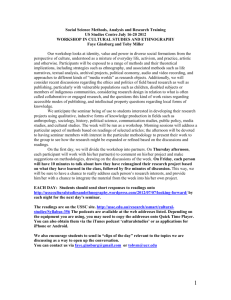Economic Anthropology Lecturer: Dr Andrew Hodges Course Status
advertisement
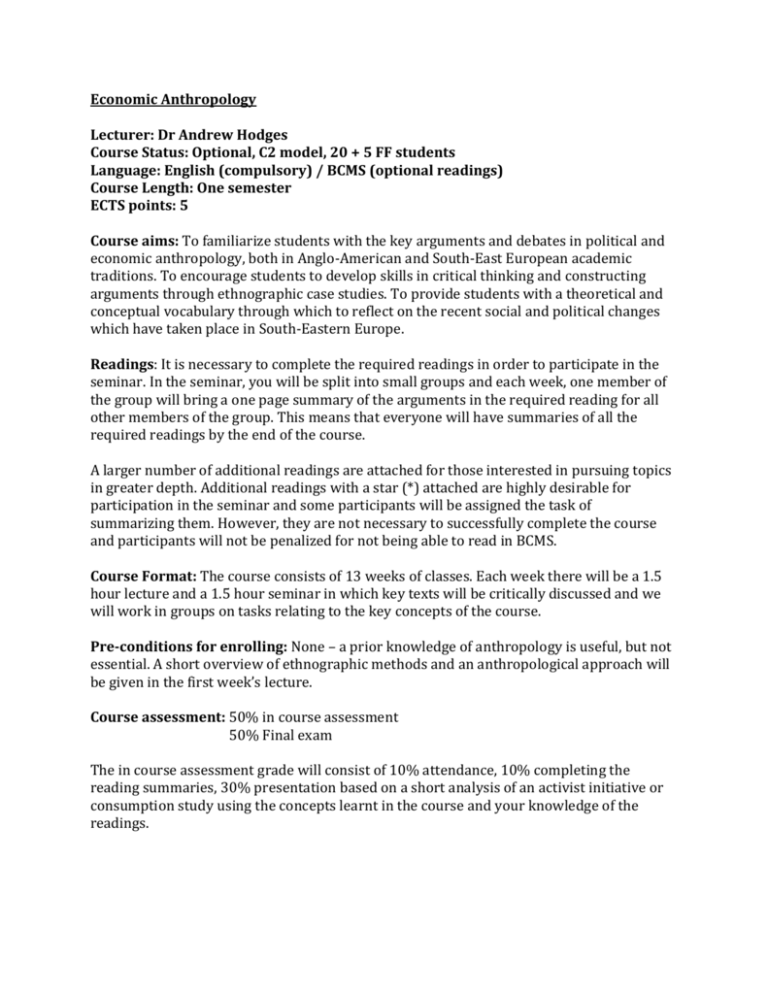
Economic Anthropology Lecturer: Dr Andrew Hodges Course Status: Optional, C2 model, 20 + 5 FF students Language: English (compulsory) / BCMS (optional readings) Course Length: One semester ECTS points: 5 Course aims: To familiarize students with the key arguments and debates in political and economic anthropology, both in Anglo-American and South-East European academic traditions. To encourage students to develop skills in critical thinking and constructing arguments through ethnographic case studies. To provide students with a theoretical and conceptual vocabulary through which to reflect on the recent social and political changes which have taken place in South-Eastern Europe. Readings: It is necessary to complete the required readings in order to participate in the seminar. In the seminar, you will be split into small groups and each week, one member of the group will bring a one page summary of the arguments in the required reading for all other members of the group. This means that everyone will have summaries of all the required readings by the end of the course. A larger number of additional readings are attached for those interested in pursuing topics in greater depth. Additional readings with a star (*) attached are highly desirable for participation in the seminar and some participants will be assigned the task of summarizing them. However, they are not necessary to successfully complete the course and participants will not be penalized for not being able to read in BCMS. Course Format: The course consists of 13 weeks of classes. Each week there will be a 1.5 hour lecture and a 1.5 hour seminar in which key texts will be critically discussed and we will work in groups on tasks relating to the key concepts of the course. Pre-conditions for enrolling: None – a prior knowledge of anthropology is useful, but not essential. A short overview of ethnographic methods and an anthropological approach will be given in the first week’s lecture. Course assessment: 50% in course assessment 50% Final exam The in course assessment grade will consist of 10% attendance, 10% completing the reading summaries, 30% presentation based on a short analysis of an activist initiative or consumption study using the concepts learnt in the course and your knowledge of the readings. Introductory Readings: If you wish to familiarize yourself with some of the topics in this course, I suggest beginning with some of the following texts: Mauss, Marcel, 1990. The Gift. London: Routledge Narotzky , Susana, 1997. New Directions in Economic Anthropology. Pluto Press. Sahlins, Marshall, 1972. Stone Age Economics. Transaction Publishers Sykes, Karen, 2005. Arguing with Anthropology: An Introduction to Critical Theories of the Gift. Routledge. Week 1 Introduction In the first session I will explain the course program. I will answer any questions students have concerning anthropology and ethnography.Practical details concerning the rest of the course will be discussed, including the mid-term assignment. Week 2 Anthropology and activism The first topic we will discuss is the relationship between anthropology and activism, looking at points of common ground as well as important ways in which anthropological and activist commitments differ. We will examine a famous debate between the American anthropologistsD’Andrade and Scheper Hughes. Scheper-Hughes proposed ‘a militant anthropology’, before later changing her perspective. We will then compare this debate with a regional case study based on an argument between the anthropologists Golubović and Naumović concerning activist anthropology currents in Serbia during the nineties. Required Readings D’Andrade, R. 1995 “Moral Models in Anthropology” Current Anthropology 36 (3):399 – 408 ScheperHughes,N. 1995 “The Primacy of the Ethical” Current Anthropology 36 (3)409 – 440 Additional readings *Golubović, Z. 2007. “Objektivna Ili SubjektivističkaInterpretacija‘ Otpora.’” Filozofija I Društvo, no. 1 (32). *Naumović, S. 2006. “‘ Otpor’-a Postmodern Faust: New Social Movement, the Tradition of Enlightened Reformism and the Electoral Revolution in Serbia.” Filozofija I Društvo, no. 31: 147–94. Gledhill, J. 2002 “Anthropology and Politics: Commitments, Responsibility and the” IN J. Vincent Ed. The Anthropology of Politics Haraway, Donna. 1988. “Situated Knowledges: The Science Question in Feminism and the Privilege of Partial Perspective.” Feminist Studies 14 (3): 575– 99. Hodges, Andrew. 2014. “The Hooligan as ‘internal’ Other? Football Fans, Ultras Culture and Nesting Intra-Orientalisms.” International Review for the Sociology of Sport, March, 1012690214526401. doi:10.1177/1012690214526401 ScheperHughes, N. 1992 Death Without Weeping California Seminar Questions 1. Do you agree with D’Andrade’s claim that political and economic anthropology has always failed, and will always fail, to be both objective and moral? Can it be both? What are the grounds of moral reasoning according to each of the authors? 2. What can a moral anthropology offer? What does an objective anthropology offer? Do we have to choose between them? 3. Is it ethical to do anthropology which ignores the political in times of crisis? 4. Analyse the relationship between a politicization of a discipline such as anthropology and a crisis situation. 5. What is the difference between descriptive accounts and explanatory ones? Week Three: Urban and rural distinctions Urban and rural distinctions form a dominant axis which approximates a class distinction in Croatia and other states in South-Eastern Europe. In this lecture we will examine urban self-positioning as a discourse of distinction amongst the general population. We will also examine urban self-positioning in activist movements in Croatia, some of which have an explicitly urban focus, such as Za Grad. We will relate these differences to the broader context of the modernizing, urbanizing claims of Marxism and the move towards retraditionalisation from the nineties onwards. We will examine Engels’ claim that the city’s failings are evidence of the immorality of relationships within capitalism. We will also considerrural romanticism and the hypothesis that not capitalism, but the context of sociality in the city is immoral. Required Readings Jansen, S. 2005. “„Who’s Afraid of White Socks? Towards a Critical Understanding of Post-Yugoslav Urban Self-Perceptions “.” EthnologiaBalkanica 9: 151–67. (Also available in Croatian: http://personalpages.manchester.ac.uk/staff/stef.jansen/documents/SJbijelecarape.pdf) Additional Readings *Ramet, Sabrina Petra. 1996. “Nationalism and the ‘idiocy’ of the Countryside: The Case of Serbia.” Ethnic and Racial Studies 19 (1): 70–87. Durkheim, Emile. 1984. The Division of Labour in Society. Translated by W.D. Hall. New Ed. Palgrave Macmillan. Engels, F. 1987 The Condition of the Working Classes of England (1944) Harmondworth: Penguin (any edition). Živković, Marko. 2001. “Nešto između. Simbolička geografija Srbije.” Filozofija i Društvo XVIII, Institut Za Filozofiju i DruštvenuTeoriju, Beograd. Seminar Questions 1. Is the city the social form of modernity? Does living in the city predict particular ways of life and specific problems? 2. In what ways do urban/rural distinctions constitute a class distinction in Croatia? 3. What are the implications of an urban identification for participants in social movements, particular those with a focus on class? 4. What makes an idea or concept ‘urban’? Week four: Ideology The term ideology is used in a variety of different ways, sometimes in a neutral sense to refer to pervasive ideas in a given society, sometimes in a negative sense to refer to particular programs of ideas designed to exert power over a population. We will first look at Naumović’s claim that South-Eastern European ethnology is dominated by ‘ideologised discourses’, by which he refers to German romanticism and Marxism. We will then consider a variety of case studies looking at language ideologies and social ideologies alongside one another. Required Readings Naumović, Slobodan. 1998. “Romanticists or Double Insiders? An Essay on the Origins of Ideologised Discourses in Balkan Ethnology.” Ethnologia Balkanica 2: 101–20. Additional Readings *Eagleton, Terry. 1991. Ideology: An Introduction. Vol. 9. Cambridge Univ Press. http://journals.cambridge.org/production/action/cjoGetFulltext?fulltextid=624029 6. Woolard, Kathryn A., and Bambi B. Schieffelin. 1994. “Language Ideology.” Annual Review of Anthropology, 55–82. Seminar Questions 1. What are ‘ideologised discourses’ according to Naumović? 2. Can any social discourse be ideology free? 3. Discuss the different meanings of the term ‘language ideologies’ 4. How do social and language ideologies differ? Week five: Capitalism and production In this lecture we will examine the thesis that analysis of social change must focus on therelations of production. How does it becomepossible to imagine the organization of social relationships in terms of theproductivity of those relations? We will examine several case studies. Evans Pritchard argued that kinship systemsmust be addressed as to how the social relations organize time as a structuralrelationship between two points in a line of descent, rather than assuming time is acontinuum in lines of descent (Fortes, Morgan). Munn raised the possibility that theMassim (Papua New Guinea) differs from industrial capitalists in their experience ofspace and time in productive exchanges of food. Finally, we will examine Thompson’s discussion of the shaping ofthe sense of time in industrial capitalism through descriptions of the socialsignificance of ‘timepieces’ and clocks, and compare that to discussions of ‘post-socialist temporality’ in South-Eastern Europe. Required Readings Marx, K. “Introduction” The Grundrisse in Tucker The Marx Engels Reader New York: Norton.222 – 293 (especially 1. Production, 222 – 226 and/or 2. The generalrelation of production to distribution, exchange, consumption. pp. 227 – 236) Additional Readings *Thompson, E. P. 1967 Time Work Discipline and Industrial Capitalism in Past and Present 38, 56 – 97 *E. E. Evans Pritchard. 1940 “Time and Space” in The Nuer Oxford pp 94 – 138 Engels, F. 1972/1878 (or any edition) The Origins of the Family, Private Property and the State. (The edition introduced by Eleanor Leacock will be useful later). Munn, N. 1986 “Food Transmission and Food Consumption” in The Fame of Gawa 49 – 63 Smith, R. 1994 “Redefining Good Social Relations: Organizing Time and Work” in Hard Times on Kariru Island Hawaii. Pp. 190 – 224 Seminar Questions 1. Does an analysis of social life which focuses on production explain power relations inall societies? 2. Discuss production as a regime of time thrift 3. Discuss the experience of time with respect to relations of production in SouthEastern Europe. Week six: Anthropologies of Consumption Other anthropologists argue that consumption is more important in explaining people’s behavior. Some have expanded the definition of consumption far beyond Marx’s intended definition, arguing that individuals reflexively and creatively construct their social identities through acts of consumption. We will examine these arguments through several ethnographic case studies, including coca-cola and sugar. Required Readings Narotzsky, S. 1997 “Consumption” in New Directions in Economic Anthropology Additional Readings *Miller, D. 2002. “Coca-Cola: A Black Sweet Drink from Trinidad.” The Material Culture Reader, 245–65. Erdei I. 2012. ČekajućiIkeu: potrošačkakultura u postsocijalizmui pre njega. Beograd: Etnološkabiblioteka. Graeber, David. 2007. Possibilities: Essays on Hierarchy, Rebellion, and Desire. AK Press. Gregory, C. 1982 “The Competing Theories” in Gifts and Commodities Cambridge University Press pp 1028 Hastrup, K. 1993 Hunger and the Hardness of Facts Man 28, 4: 727 – 739 (online) Miller, Daniel. 1997. “Consumption and Its Consequences.” http://eprints.ucl.ac.uk/117835/. Mintz, S. W. 1985 “Consumption” In Sweetness and Power: the Place of Sugar in Modern History Harmondsworth, Middlesex: Penguin Mintz S. W. 1997 “Time, Sugar and Sweetness” In Counihan, C. and P. van Esterik (eds) Food and Culture: A Reader. London & New York: 357 – 369. Simić, Marina. 2012. “When Money Is Not Enough. Selling and Shopping in Novi Sad.” EthnologiaBalkanica, no. 16: 73–91. Seminar Questions 1. Why should the study of food address production and consumption simultaneously? 2. What is consumption? 3. Summarise and critically discuss Mintz’s argument in Sweetness and Power Week seven: Consumption and the household It has long been assumed that in households, persons are most able to satisfy their personal desires for consumer goods. Furthermore, households became a unit for the comparative analysis of differences in the social reproduction of society because they produce both social and biological relationships through practices of consumption. The anthropological literature is divided however, on the question of whether the household is key to modern social relations, or slows down progress. We will examine these claims through a number of case studies, including (i) Chayanov’s model of the Russian peasant household, written in the early twentieth century to (critically) assist Soviet planning, and later (mis)used as a universal model by the anthropologist Sahlins, and (ii) the zadruga. We will relate such debate over the function of households to recent discussion over morality and the family in Croatia, including the recent referendum over the definition of marriage in the constitution. We will also touch on the issue of domestic labour. Required readings Sahlins, M. 1972 “The Domestic Mode of Production” in Stone Age Economics Additional Readings *Narotzky, S. 1997 New Directions in Economic Anthropology London: Pluto pp.99157 (see especially her discussion of Chayanov in this chapter) *Gorunović. Marksistički model dinarske zadruge u srpskoj etnologiji. Antropologija 2, 110-142. Gregory, C 1982 “A Framework of Analysis: The General Relation of Production toConsumption, Distribution and Exchange.” In Gifts and Commodities pp 29 33“The production of commodities by means of commodities1. The methods of production; 2. The methods of consumption” in Gifts and Commodities(pp. 71 – 77) Chayanov, Alexander V. 1966. “Peasant Farm Organization.” The Theory of Peasant Economy, 29–278. Federici, Silvia. 2004. Caliban and the Witch. Autonomedia. Seminar Questions 1 Does confusing women as both persons and things (subjects and objects) harness families into state capitalism? 2. Is women’s work hidden production? 3. Is consumption simply the ‘work’ of household? 4. Is money simply another commodity? Week eight: Commodity Fetishism and the Exploitation of ‘Natural’ Resources The theory of commodity fetishism offers apowerful explanation for the creation of social differences. First we will look at a famous anthropological case study, in which Taussig described how Bolivian Tin Minersacknowledge commodity fetishism as an exploitative process through their rituals andcreate a Christian cult as a critique of capitalism.We will then consider some other examples and examine the application of the concept in a postsocialist context. Required Readings Taussig, M. 1985 The Devil and Commodity Fetishism. Marx, K. 1978/1887 “The Fetishism of Commodities and the Secret Thereof” in Tucker The Marx – Engels Reader pp. 319 –329 New York: Norton Additional readings Gregory, C. 1980 “Gifts to Men and Gifts to Gods” Man 15 (4): 626 – 652 Nash, J. 1992 We Eat the Mines and the Mines Eat Us. Prica, Ines, Tea Škokić, Valentina Gulin Zrnić, and Sanja Potkonjak. 2011. Horror, Porno, Ennui: KulturnePraksePostsocijalizma. Institut za etnologiju i folkloristiku. Jolly, Margaret 1987. The Forgotten Women: a history of migrant labour and gender relations in Vanuatu. Oceania 58(2):119139. Kelly, John 1997. “Gaze and Grasp: Plantations, Desires, Indentured Indians and Colonial Law in Fiji”. In Lenore Manderson and Margaret Jolly (eds) Sites of Desire, Economies of Pleasure: Sexualities in Asia and the Pacific. Chicago and London: University of Chicago Press, 7298. Lal, Brij 1985. Kunti’s Cry: Indentured Women on Fiji Plantations. Indian Economic and Social History Review, 22:5571. Saunders, Kay 1982. Workers in Bondage: the origins and bases of unfree labour in Queenland, 18241916. Seminar Questions 1. In circumstances of cross-culturalexchange and trade, why do the peopleparticipating feel they must differentiate between gifts, sacrifices andcommodities? 2. According to Marx, why does commodity fetishism lead to or deepen alienation in modernity? 3. According to the ethnographic record, how is commodity fetishism experienced differently in post-socialist contexts? Week nine: Gift exchange and gift economies Commodities are generally understood as goods that are subject to market exchange but anthropologists have expanded, problematized and relativized this definition. In this lecture we will look at Marcel Mauss’s famous argument in The Gift, and attempt to analyse the difference between gifts and commodities. Required Readings Mauss, Marcel, 1990. The Gift. London: Routledge Additional Readings Dumont, Louis, 1980. ‘On Value’ Proceedings of the British Academy, no 66; 207 241, Reprinted as Dumont, Louis, 2013. HAU: Journal of Ethnographic Theory 3 (1): 287–315. Seminar Questions 1. Is there such a thing as a free gift? 2. Why do people exchange gifts? 3. To what extent are gifts and commodities different? Week ten: Reciprocity In this lecture we will cover the formalist-substantivist debate, which concerned the kinds of explanations andmodels that could be used to understand economic life cross-culturally. To what extent can we assume generalized utilitarianism and maximization to be universal? Are markets always embedded? And what role is played by the natural environment? Required readings Marshall Sahlins 1972: The Original Affluent Society, in Stone Age Economics Additional Readings Woodburn, James. 1982. Egalitarian Societies. Man vol. 17, issue 3, pp. 431-451. Week eleven: The state This week we will ask just what kind of social form is a State. Why is ‘the State’ such an elusive form when its effects can be so concretely felt? How can it be approached ethnographically? We will examine possible ethnographical approaches to the state, based on the work of Trouillot, Scott and Gupta and Ferguson. We will then consider some case studies, including Brković’sethnography of humanitarian actions in a small town in Bosnia. Required Readings Trouillot, Michel, Rolph. 2001. “The Anthropology of the State in the Age of Globalization: Close Encounters of the Deceptive Kind.” Current Anthropology 42 (1): 125–38. Additional Readings *Brković, Čarna. 2014. “Scaling Humanitarianism: Humanitarian Actions in a Bosnian Town.” Ethnos, no. ahead-of-print: 1–26. Gledhill, J. 1994 “From Hierarchy to Surveillance: The Politics of Agrarian Civilization and the Rise of the Western Nation State”. In Power and Its Disguises pp. 47 69London:Pluto Press Gupta, Akhil, and James Ferguson. 1997. Culture, Power, Place: Explorations in Critical Anthropology. Duke University Press. Nagenstat, C. 1994 “Violence, Terror, and the Crisis of the State” Annual Review ofAnthropology 109 – 136 Scott, J.C. 1998 Seeing Like a State: how certain schemes to improve the human condition have failed New Haven: Yale University Press. Spasić I. & Birešev A. 2012. 'The state as the great classifier' In: Cvetičanin P. & Birešev A. (eds) Social and cultural capital in Western Balkan societies. Niš: Centre Empirical Cultural Studies SE Europe. 145-159./ili/ Spasić I. 2013. Kultura na delu: društvena transformacija Srbije iz Burdijeovske perspektive.Beograd: Fabrika knjiga. 122-140. Week 12: National Cosmology Drawing on the previous weeks insights into the anthropology of the state, this week we will examine the hypothesis that national categories are an effect of the existence of the modern state. This will be further developed through Malkki’s concepts of ‘national cosmology’ and ‘national mythico-history’, where a history is emphasized with a moral charge which promotes identification with that history and self-understandings as members of a particular nation, in a wider ‘cultural mosaic’ of nations. Required Reading Malkki, L. 1992. “National Geographic: The Rooting of Peoples and the Territorialization of National Identity among Scholars and Refugees.” Cultural Anthropology 7 (1): 24–44. Available in BCMS: Malki L. [Malkki L.] 2008 (1992). 'Nacionalnageografija: ukorenjivanjeljudi I teritorijalizacijanacionalnogidentitetaizuglateoretičaraiizbjeglica (prev. D Tripković) ' Treći Program (Radio Beograd) 137-138: III,21-41. Additional Readings Douglas M. 2004 (1966). 'Svjetovno onečišćenje' U: Čisto i opasno: antropološka analiza pojmova nečistoće i tabua (prev. T BukovčanŽufika). Zagreb: Douglas, Professor Mary. 2003. Natural Symbols: Explorations in Cosmology. 3rd ed. Routledge. Jansen S. 2005. 'National numbers in context: maps and stats in representations of the postYugoslav wars' Identities: Global Studies in Culture and Power 12:1, 45-68. Malkki, Liisa H. 1995. Purity and Exile: Violence, Memory and National Cosmology Among Hutu Refugees in Tanzania. 2nd ed. University of Chicago Press. Seminar Questions 1. Who might be considered an ‘anomaly’ in the national order of things? 2. How is national cosmology elaborated in Croatia? What events are considered important in the mythico-history? 3. How do different politicians engage with a national mythico-history? 4. Can we speak of other mythico-histories, for example concerning (i) local ‘ethnic’ categories (ii) antifascism. How powerful are they compared to national mythico-history? 5. Is national cosmology experienced differently in urban and rural environments? If so, why is this? Week 13: Prefiguring One of the main strengths of anthropology is that the ethnographic record demonstrates the vast variety of different possible ways societies have been organized throughout history. An awareness of this therefore permits the development of an imagination which does not take existing social arrangements for granted, and which can use such knowledge to ‘prefigure’ different modes of organizing social relations. This lecture will examine this concept with respect to social movements, bringing the different threads of the course together. Time will also be allotted for revision of the major concepts of this course. Required Reading Yates, Luke. 2015. “Rethinking Prefiguration: Alternatives, Micropolitics and Goals in Social Movements.” Social Movement Studies 14 (1): 1–21. Additional Readings Graeber, David. 2004. Fragments of an Anarchist Anthropology. 2nd ed. Prickly Paradigm Press. Seminar questions 1. In what everyday situations do you use prefiguring? In what sense are such activities political?

